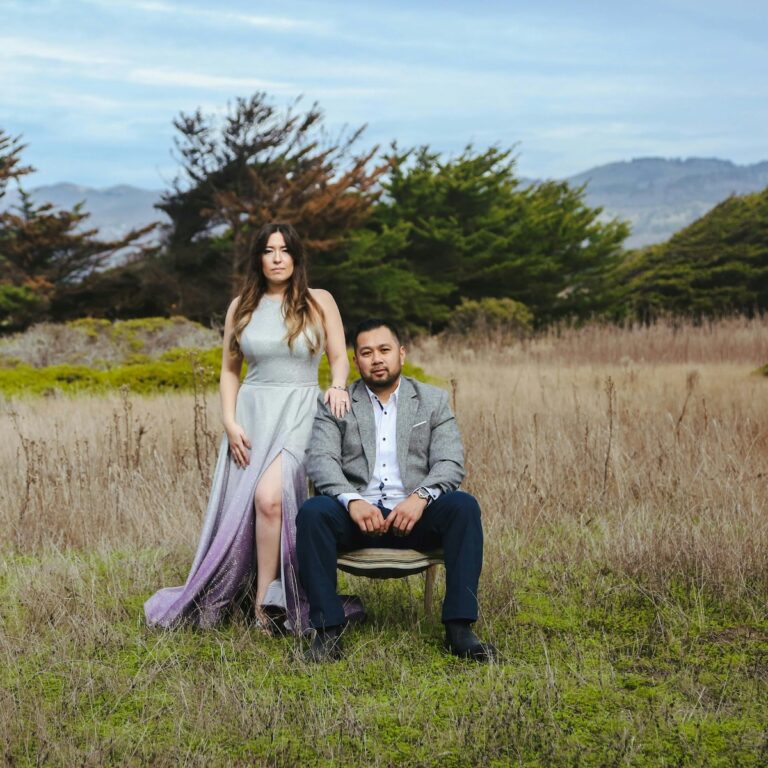Few situations in life are as high-pressure as being asked to serve as a bridesmaid…when you don’t really want to (or simply can’t). How can you possibly turn it down?
After all, some brides spend days crafting the perfect way to ask their best friends and family to be their bridesmaids. A lot start saving ideas before they even get engaged!
And 99 times out of 100, the bridesmaids happily say yes. So brides usually aren’t expecting a “no.”
Whether it’s because of money, time, a lack of closeness to the bride, or simply despising all things wedding, you’ve got your reasons. You know in your heart you can’t or don’t want to accept this role.
So how can you tell the bride no without breaking her heart?
9 Steps to Turn Down Being a Bridesmaid Without Crushing the Bride
1. Be completely sure of your decision to turn down a bridesmaid role.
First and foremost, be absolutely certain you will not be able (or willing) to accept your bridesmaid position.
Wedding planning is stressful and time-consuming, and brides have to lock key details down months in advance. This includes everything from the guest count, to the venue, to how many people will be in their wedding party.
While some brides do add bridesmaids at the last minute, it’s pretty rare. Odds are, you won’t be able to suddenly pop into the group chat and say, “Changed my mind, sign me up!”
So be sure that you’re sure. And if it’s not that you don’t want to do it, but can’t, make sure those reasons aren’t likely to change.
Just because money is tight right now, doesn’t mean you won’t land a new job or side hustles before the wedding. Alternatively, you might be able to work with the bride on budget-friendly dresses or more local bachelorette weekends.
Maybe you’re not all that close to the bride (like if the groom is your brother), so it feels weird to join the ranks of her BFFs or blood relatives in the wedding party. But who knows? This might be the perfect opportunity to bond with your soon-to-be sister-in-law.
Play the odds here, however. Yeah, you don’t know with absolute certainty you’ll be exhausted from caring for your newborn, who’s due just two weeks before the wedding. But it’s a safe bet, and a completely understandable reason to turn down a bridesmaid role.
2. Tell her in advance if the opportunity arises (and you know for sure she’s going to ask you).
Perhaps you’ve heard through the grapevine, or from the bride herself at some point, that you’ll be asked to join the wedding party.
If that’s the case, let the bride know as soon as you can that she should consider someone else to fill that bridesmaid slot.
Don’t be presumptuous, of course; if you don’t know for sure she’s going to ask you, turning it down might get awkward and embarrassing. But, if you do know that maid-posal is on the horizon, nipping it in the bud can be the way to go.
3. If you can’t tell her in advance, let her actually ask you to be a bridesmaid first—fanfare and all.
Advance notice doesn’t always work, so you might have to just bite the bullet and let the bride ask you.
Yes, even if you suspect she’s putting together elaborate gift baskets for each of her girls with a cute “Be my Bridesmaid” card.
Yes, even if that “big girls’ brunch” she’s planning gives you the sinking feeling she’ll ask you and the other candidates all at the same time.
Obviously, this makes the blow feel even more harsh to deliver (hence the previous step: telling her in advance if you can). But sometimes we don’t get the benefit of warning, and might find ourselves smack-dab in the middle of a bridesmaid proposal before we know it.
In that situation, awkward as it feels—it’s best to avoid taking the wind out of the bride’s sails. Let her ask you.
What’s more, try to enjoy being asked! Even if you know you don’t want to be a bridesmaid—or you do, but can’t afford it or won’t have time—you can still appreciate the offer. Especially if the bride went to extra effort to prepare a card, gift, or dinner to accompany the question.
Wait until she’s done, thank her for the offer, and compliment any extra effort she put into the bridesmaid proposal. If you’re around other people, do these things twice—once among the crowd, and then again in private later on, where you can give your answer.
4. After thanking the bride, give her an apology.
First, you’ll of course start with an apology for turning the bridesmaid role down.
Even if you hate weddings more than anything else on this planet, don’t care for the bride at all, and would rather walk over hot coals than be a bridesmaid (I highly doubt it’s that bad!)—remember that you’re touching a nerve here.
Chances are, you won’t have to fake an apology, no matter what your reasons are for rejecting the position. Or bowing out, if you’ve already accepted (more on that later). You can find at least one element you’re truly sorry for here, even if it’s just that the bride got her hopes up, and now you have to let them down.
“I’m so sorry, but I have to decline” is a simple starting point. It leads you into providing your reasons—covered more later in this list—but puts the message front-and-center, while still expressing your regret.
Depending on how well you know the bride, you can deliver it how you know she’ll take it best: slow and gently, easing her in…or short, sweet, and to the point, if she’s always been one to appreciate cutting to the chase.
5. Use definitive language—no maybes.
This was a hard-learned lesson for me.
Years ago, I was asked to a bridesmaid for a friend I knew fairly well…but not, in my opinion, well enough to be in her wedding. To top it off, my kids were starting school the week of her wedding, and I was already the Matron of Honor in two other weddings that year—one right before this friend’s date, and one about two months after.
To put it simply, I was already stretched very thin.
Energy, time, and money are finite resources, and I knew if I said yes to being a bridesmaid for her, I was going to reach my limit.
I did the previous steps correctly: I let her ask me (easy enough, since I had no suspicion she was even going to!), waited until we had privacy, thanked her sincerely for the honor…and then apologized.
But instead of saying clearly and firmly, “I just can’t do it, for these reasons,” I made the mistake of only citing one reason: money.
A few weeks later, when I announced to our friend group I’d just landed a big freelancing gig, the bride texted me separately to ask, once again, if I would be a bridesmaid now that finances were looking up.
Because of my lack of clear and firm language the first time around, I now had to reject my bridesmaid proposal twice!
Don’t make the same mistake.
Use clear, concise language in your apology, rejection, and explanation. Words like “maybe,” “if,” and “I wish” don’t set your decision in stone.
You’re trying to let the bride down gently, not generate false hope.
6. You don’t owe her an explanation, but it’s nice to give one.
One of my favorite mantras is, “‘No’ is a complete sentence.”
This is my go-to advice for brides dealing with overbearing mother-in-laws, or for bridesmaids grappling with demanding brides. In fact, it’s my go-to advice for almost any personal conflicts we encounter in life.
“No” is enough. You don’t owe anyone an explanation or justification for your life decisions.
Sometimes, however, it’s simply the polite and kind thing to offer—especially when your decision affects the other person.
Tread lightly, of course. “I don’t know you that well” or “I hate weddings” may be the truth, but not exactly tactful.
What’s more, the bride could argue with those reasons—and she’d be right. “You can get to know me,” she might say, or “My wedding won’t be like the others you’ve been in, I promise! You’ll have fun.”
Granted, you can stand your ground and stick by your reasons (and you should). But it’s simpler to highlight other reasons, if you have them, or rephrase your reasons. “I’ve been a bridesmaid before, and it’s not an experience I want to repeat,” for instance.
Financial concerns, time constraints, pregnancy—you can decide to share your reasons for rejecting a bridesmaid position or not. Either way, expect the bride to ask, and prepare your answers ahead of time.
7. Thank her for the honor and consideration regardless.
At the end of the conversation, thank her again and assure her you’re honored to have been considered. It’s a big deal to get asked to stand beside a person on the biggest day of her life, after all.
8. Give her space and time to process your rejection of the role.
Keep in mind that, no matter how gently you deliver the rejection, it is a rejection. And rejection stings.
The bride will need some time to process how she’s feeling. Even if she’s understanding or seems fine in the moment, there’s going to be a unique “grieving” stage to go through.
Chances are, she didn’t expect you to say no, so she’s going to feel shocked at first. Then she’ll be upset or disappointed…and maybe even mad.
If you turn down being a bridesmaid with tact and kindness, you can’t blame yourself for the bride’s reaction. You did your part. The rest is out of your hands for now, because we can’t control other people’s emotions.
9. Follow up.
A few days or a week after your conversation with the bride, reach out and see how she’s doing.
Resist the urge to apologize again, however; you’ve done that enough. Too many “I’m sorry’s” can erode the definitiveness of your decision, and give the bride false hope you’ll change your mind.
Just let her know you care about her and hope she’s doing all right, and—if you truly want to or are able—offer to still give feedback on wedding ideas, or help with the ceremony in another, smaller capacity. But don’t do it out of obligation, or because you think she’s upset with you.
Even if she is, she might just need more time.
And if weeks go by, and—despite how gentle and tactful you were—she’s still mad or upset, or even ignoring you completely? You might consider this a dodged bullet. There’s a high probability she’s the kind of bride who’s used to getting her way, views her bridesmaids as props, and takes others’ boundaries as personal attacks.
Keep in mind that she is still allowed to be upset, as long as she’s not treating you unfairly or passive-aggressively because of it.
She has a right to feel sad. But, beyond your initial apology, you don’t have the obligation to fix it.
What If You Already Said Yes? How to Bow Out Of Being a Bridesmaid
It’s possible that, in the moment, you said yes to being a bridesmaid without meaning it.
Or you got excited, accepted—then reality set in when you remembered your schedule or budget.
Maybe something changed in your life suddenly, like pregnancy or job loss, and now you have to bow out. Or, similarly, this wedding is slowly turning into one big, expensive nightmare you weren’t prepared for when you said yes.
How can you reject the role after the fact?
The same steps as above still apply: privately, thank the bride again for the honor—but let her know, clearly yet gently, that you’re going to have to step down.
Once again, you don’t owe anyone an explanation, but it is nice to offer one. Especially since the wedding is closer, and your decision does impact the bride.
Speaking of the wedding being close: do not quit as a bridesmaid when the wedding is approaching. Unless it’s a dire emergency—the kind of thing that will keep you from even attending the wedding as a guest—it’s too late: you have to see your commitment through.
Yes, even if it feels impossible, or you just plain don’t want to.
Bowing out of a wedding hurts more feelings, more deeply, than saying no from the start. It inconveniences others far more the closer the date gets, too. Plans have to be changed. Costs and jobs have to be redistributed among the bridesmaids. The bride feels like this is just Another Thing Going Terribly Wrong in a long list of wedding disasters.
So don’t bow out close to the wedding date unless your reason is huge, and will keep you from attending the wedding at all.
You Are Not Obligated to Be Anyone’s Bridesmaid
You’ve probably heard the expression, “Weddings bring out everyone’s true colors.”
I prefer to think of it differently: Weddings magnify most people’s flaws and put them on display.
People who have trouble making decisions turn into bridechillas; entitled and spoiled people turn into bridezillas. People who love drama will stir the pot and cause rifts in the wedding party.
And people who don’t respect boundaries will disrespect yours.
If the bride or other bridesmaids treat you poorly or guilt you over turning down the bridesmaid role, don’t apologize more than you already have. And certainly don’t give in.
A bridesmaid role is an honor, but it’s also a ton of hard work, financial stress, and societal pressures to act and look a specific way at multiple events. Yes, it was reasonable of the bride to expect you’d say yes. But it’s more than reasonable for you to turn it down, too.
Any respectful friend (or even just a respectful person) shouldn’t hold your rejection of the role against you.
If they do hold a grudge because you turned down being a bridesmaid, consider yourself very lucky to be missing out on that so-called honor.









